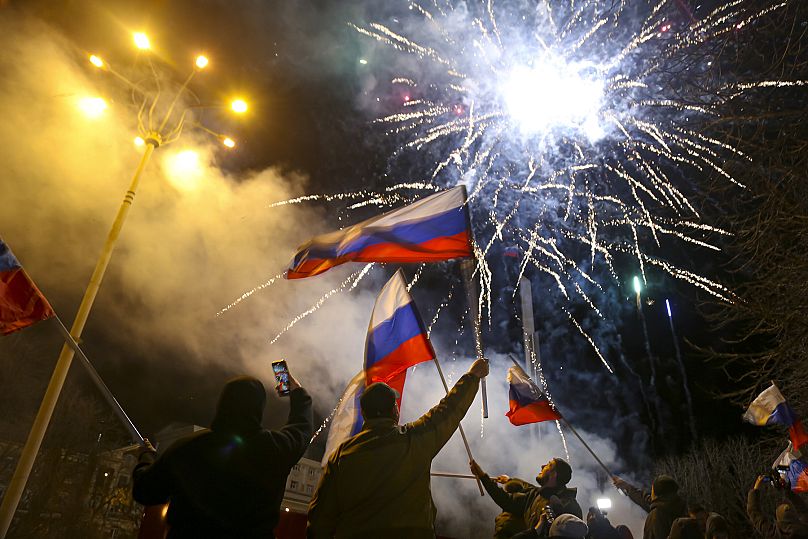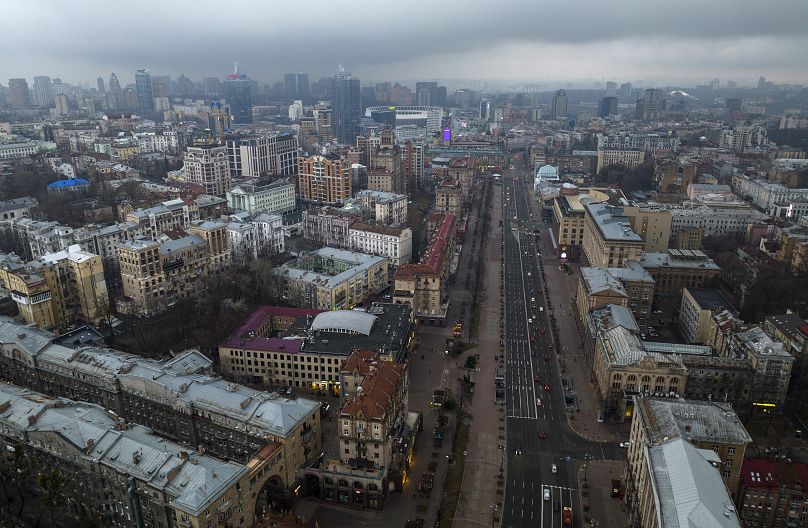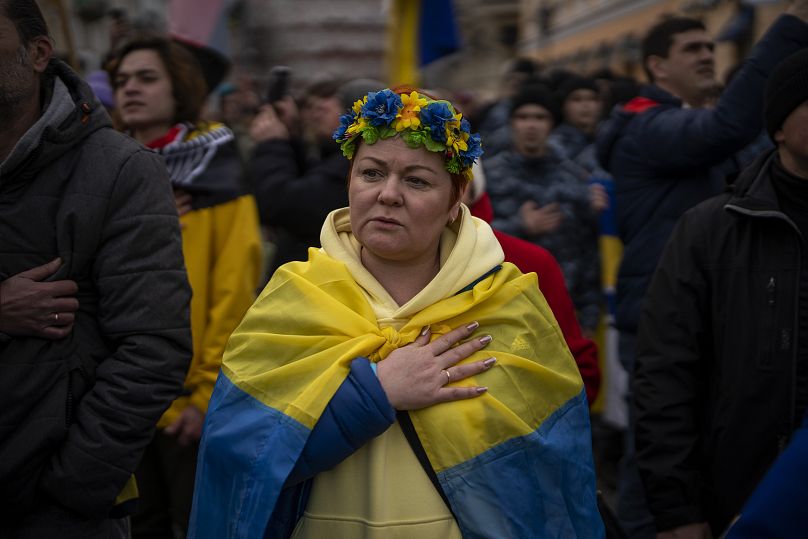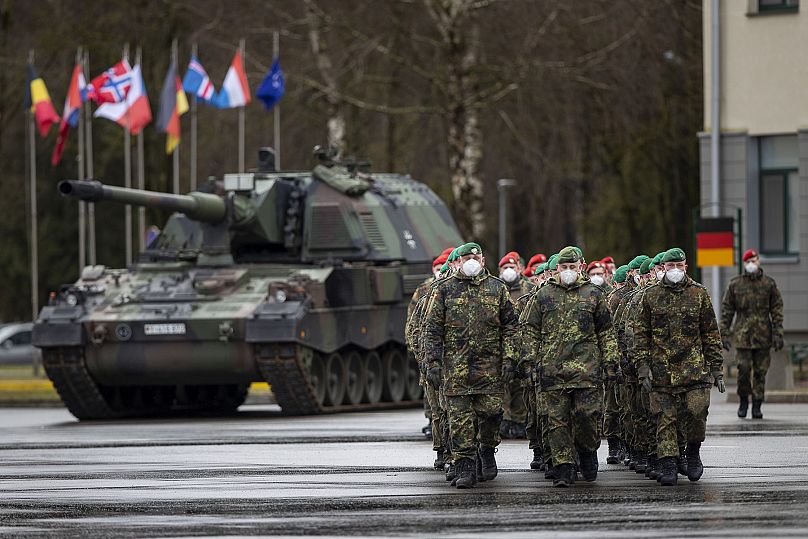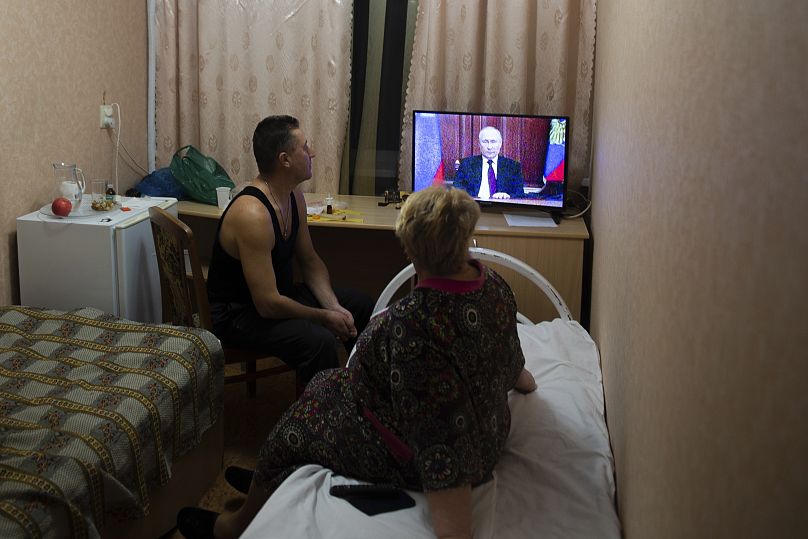Russia's president sees the country - alongside Belarus - as part of 'Greater Russia'.
Europe woke up on Thursday to the news that Russian troops had advanced into Ukraine, as Vladimir Putin warned the international community that intervening would lead to "consequences you have never seen."
 ADVERTISEMENT
ADVERTISEMENT
 ADVERTISEMENT
ADVERTISEMENT
Ukrainian President Volodymyr Zelenskyy declared martial law, broke off diplomatic relations with Russia and said that Ukraine had a millions-strong army ready to defend the country. He called on the international community to prepare an anti-Putin front to force Russia out of Ukraine.
European Union leaders will meet in Brussels later this evening after European Commission President Ursula Von der Leyen promised severe sanctions on Russia. US President Joe Biden, who warned of a possible invasion for weeks, said he was meeting G7 leaders later on Thursday.
Estonia, Latvia, Lithuania and Poland agreed to hold consultations under NATO's Article 4, which members of the alliance can do when they feel the territorial integrity or political independence of an ally is threatened, even when the ally is not a NATO member.
Putin has claimed that the invasion is intended to defend the populations of the occupied territories in the so-called Donetsk and Luhansk Peoples' Republics, which claimed independence in 2014. On Monday, Putin formally recognised the independence of the two territories.
Ukrainian Minister of Foreign Affairs Dmitro Kuleba said on Thursday morning that "this is not a Russian invasion only in the east of Ukraine, but a full-scale attack from multiple directions".
But it was on Monday that Putin appeared to give an insight into his own beliefs about Ukraine and its links with Russia and the Soviet Union.
What does Putin think about Ukraine?
He claimed that Ukraine, an independent state of 44 million people and Europe’s largest country, was an artificial invention created by the Bolsheviks after the 1917 Russian revolution.
"Modern Ukraine was entirely created by Russia," he said. "Lenin and his associates [severed] what is historically Russian land."
Historians and experts on Eastern Europe branded it "incoherent".
"It was illogical, revisionist hodgepodge," said Tom Junes, a historian at the Polish Academy of Sciences.
Junes said the speech was an apparent attempt to further scare Ukrainians.
Did the Soviet Union 'invent' Ukraine?
Ukrainians argue that the origins of their state dates from a millennia before anyone had even heard of the Bolsheviks, back to the Kyivan Rus' and the acceptance of Christianity by Prince Volodymyr in 988.
Mykhailo Hrushevsky, the Ukrainian historian, has traced a clear thread between that state and those that eventually followed, such as the Hetmanate in the 17th century, and the Cossack kingdoms, said David Marples, a professor of Russian and East European history at the University of Alberta.
Ukrainian language and culture were suppressed in later periods prior to 1917, such as when Ukraine was under the yoke of Poland and Tsarist Russia.
But contrary to Putin's claims, there were few Bolsheviks in Ukraine in 1917 and the period from 1918 to 1920 — after the withdrawal of the German army — was one of "total chaos".
"There were about eight different governments before the Bolsheviks were able to occupy it. Even then, they established the capital at Kharkiv because Kyiv was not secure," Marples said.
In the early Soviet era, Ukraine was given more autonomy and restrictions were lifted on the Ukrainian language.
“In much of what Putin is saying — and this seems to be a pattern for a while — there are some elements of truth which he cherry-picks and mixes in with a nationalist reading of history," said Junes.
But the fact that the Soviets at times gave more rights to Ukrainians does not equal inventing them, Junes added.
Additionally, Ukrainians were among the victims of Stalinist Russia, with the 1932-33 Holodomor famine killing between four and seven million people and significantly altering the demographics of the country.
Ukrainian communist deputies were forcibly moved to central Asian republics in 1930 and imposed Russification of the territory saw crackdowns on the Ukrainian language and culture under Stalin and later under Ukrainian Communist Party First Secretary Volodymyr Shcherbytsky.
Putin said during his speech that Ukrainians that reject the Soviet role in Ukraine were being "ungrateful".
“Even on a factual level, this statement is wrong. The public debate on the Soviet past is often politicised and misconstrued not allowing room to understand the complexities, but Putin is taking distortion of the historical past to the next level,” Junes said.
Where are the Donetsk and Luhansk People's Republics and why do they matter?
Claims made by Putin in his hour-long speech almost overshadowed his subsequent recognition of the independence of the two breakaway Ukrainian regions in the Donbas, the so-called Donetsk and Luhansk People's Republics.
It followed a vote by the Duma for Putin to recognise the two Russian-controlled regions, which in 2014 declared independence after the Russian annexation of Crimea.
The war between Ukraine and the separatists has since claimed around 14,000 lives, despite the ceasefire that followed two agreements in Minsk, Belarus.
Putin’s speech is the first time that Moscow openly admitted its involvement in the war, and the Duma's approval of Russian military forces in the region ends any plausible deniability of the Kremlin’s complicity, Junes said.
"After eight years of denying their role in Donbas, they have finally stepped up and admitted that they are involved," he said.
So, why does Putin say the things he says?
For Putin, Ukraine is the final piece of the 'Greater Russia' dream, which also includes Belarus.
But while Belarus' strongman leader Alexander Lukashenko is a close ally, tensions between Russia and Ukraine have often been fraught since its independence in 1991 — reaching their peak in 2014 following the annexation of Crimea.
His claims about the history of Ukraine are part of a wider trend of historical revisionism across Europe, as right-wing governments and movements reinterpret history to fit new political narratives and bolster support.
But in practical terms, Putin's greatest bugbear to achieving his goals has been NATO and its extension eastwards into what he considers to be Russia's sphere of influence.
Putin has insisted that NATO non-expansion be formalised in a signed agreement, while Russian Foreign Minister Sergei Lavrov has said this accord could even include Romania and Bulgaria leaving the alliance.
Who supports Putin?
So far, only Cuba, Venezuela, Nicaragua and Syria supported the Russian recognition of independence for the occupied regions in Luhansk and Donetsk.
The EU was quick to dole out sanctions against Russia's political leadership, including the likes of Lavrov and Defence Minister Sergey Shoigu, announcing the full list on Wednesday night.
The US President Joe Biden issued another wide-ranging set of sanctions, targeting Russia's sovereign debt and major financial institutions, as well as the country's elites and their family members.
Germany also put Nord Stream 2's approval on hold, blocking the €10-billion Russian-owned pipeline project indefinitely.
Do Russians agree with Putin?
Marples said that, unlike the annexation of Crimea in 2014, "few in Russia care about the DPR and LPR".
Alexey Kovalyov, an investigative editor at Meduza, said many Russians were shell-shocked by Putin's speech on Monday.
"We knew something was coming, something heavy, and it was the same uneasy feeling that we felt eight years ago — this kind of fatalistic resignation in many people where you know that things are going to get a lot worse than they already are," he said.
The sentiment in Russia is a far cry from the patriotic wave that swept many in the country in 2014, he said.
"Eight years ago, there was a lot of this uncanny, jingoistic patriotic rhetoric that was just shouting in your face about how great Russia is. There were stalls in the streets where people would sign up as volunteers [to fight in Donbas], or collection boxes with people pitching in money for their brethren in eastern Ukraine," he said.
"There's nothing of the sort now. People don't care much about it."
Every weekday, Uncovering Europe brings you a European story that goes beyond the headlines. Download the Euronews app to get a daily alert for this and other breaking news notifications. It's available on Apple and Android devices











